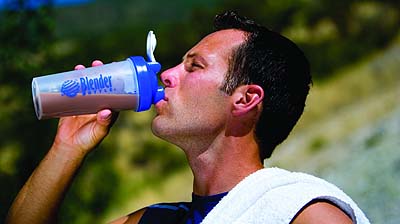Sports Nutrition Supplement
Have you ever wondered what the optimum combination of food intake is to maximize performance in your sport or activity? What proportion of protein, carbohydrates and fats should you consume?
What kind of acitivites are you primarily involved in? Is your primary focus cardiovascular (e.g. running, cycling, triathlons, swimming, etc.)? Or are you primarily involved in weight bearing activities (e.g. weight lifting, bodybuilding, etc.)? What about combination sports (e.g. hockey, football, etc.)?
Generally speaking, we find that most cardio endurance athletes have a tendency to include greater amounts of carbohydrates in their diets while those involved in resistance training tend to lean towards greater amounts of protein. So what is right for you?

Well, first of all, everyone requires nutrition from all the major food groups: fats, carbohydrates, protein and water-rich foods. The foundation of any solid sports nutrition diet begins with water-rich foods. These are raw organic fruits and vegetables. The next crucial elements are whole grain breads, cereals, rice and pasta. Roughly 55-65% of your caloric intake should be in the form of carbohydrates. Not only will these categories of food provide you with high quality sources of carbohydrates, but raw organic fruits and vegetables are an excellent source of vital vitamins and minerals. Next are the protein-rich foods. These foods are necessary for building and repairing muscle tissue. They are a source of crucial amino acids. They include all meats, nuts, legumes, tofu and dairy products. Consume medication-free meats (organic whenever possible) and go organic on all categories of food, whenever you can.
Organic foods provide highly elevated levels of hundreds of micronutrients that complement and support the benefits of the macronutrients you consume. Lastly, the body requires some element of fats and sweeteners. Choose polyunsaturated fats and naturally-sourced unrefined sweeteners. If you add salt, use organic sea salt.
So, what about supplements? It is extremely difficult to follow the recommendations above every day at every meal. We live hectic lives where access to the ideal foods is not readily available. We tend to include a great deal of convenience foods into our diets. And even if we are able to follow the recommendations above, the higher the level of exercise (intensity, duration and frequency), the greater the need for supplementation. To help protect yourself and improve your chances of heightened performance, we recoommend all athletes use a solid founation of vitamins and minerals. We recommend you use a high quality full spectrum vitamin and mineral pack, complete antioxidant drink formula and a liquid adaptogenic formulation (especially for those of you in endurance sports).
Although they are called protein shakes because of the protein powder used to make them, protein shakes can be an excellent meal replacement. They are healthy, nutritious, easy-to-make and convenient. They can be extremely beneficial in both pre- and post-workout situations. For a sample recipe, please click here. For snacks, consider high quality energy bars. They are convenient and fill the gap bewteen meals.
By following the guidelines on this page, we hope you will find not only improved sports performance but a healthier and longer life.
About the Author: John Lord is a sports enthusiast and free lance writer on many aspects of health, especially as they relate to sports and fitness. John uses a comprehensive supplementation program to effectively boost his own athletic performance. He is passionate about promoting a drug-free healthy lifestyle including organic products and natural supplements.
Bodybuilders often take a powdered form of protein, which contains the essential building blocks for muscle. The powder is mixed with water, milk or juice and often flavoring, resulting in a form known as a "shake" (as in milkshake) or "pudding". Protein powder is generally consumed immediately before and after exercising, or in place of a meal. Some types of protein are to be taken directly before and after a workout, while others are to be taken before going to bed. The theory behind this supplementation is that having a sufficient protein intake allows for efficient growth and repair of muscle tissue.
Currently, no consensus has been reached in determining whether or not an individual in exercise training can benefit from protein and amino acid supplements. Protein supplements come in various forms: ready to drink shakes, bars, bites, oats, gels and powders. Protein powders are available in a variety of flavors including strawberry, vanilla and chocolate. Some advertisements claim that they aid in fat loss, slowing the aging process and muscle building.
* Whey protein contains high levels of all the essential amino acids and branched-chain amino acids. It also has the highest content of the amino acid cysteine, which aids in the biosynthesis of glutathione. For Bodybuilders whey protein provides amino acid used to aid in muscle recovery. Whey protein is derived from the process of making cheese from milk. There are two types of whey protein: whey concentrate and whey isolate. Whey concentrate is 29%–89% protein by weight where whey isolate is 90%+ protein by weight.
* Casein protein (or milk protein) has glutamine, and casomorphin.
* Soy protein Soybeans contain isoflavones, a type of phytoestrogen.
* Egg-white protein is a lactose- and dairy-free protein.
* Hemp seed contains complete and highly-digestible protein and hemp oil is high in essential fatty acids.
* Rice protein- when made from the whole grain it is a complete protein source that is highly digestible and allergen free
